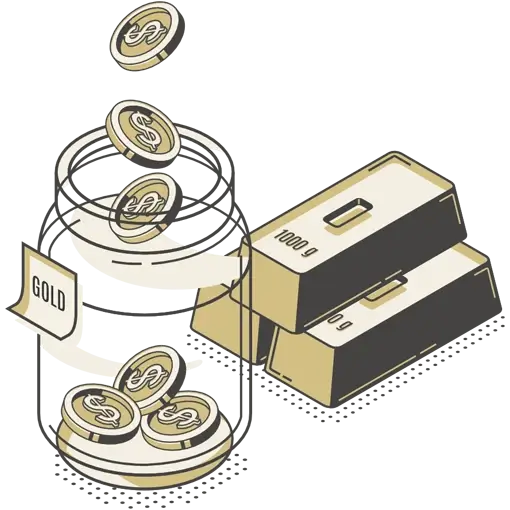

How to Buy Gold Coins Safely in an Uncertain World
Gold and other precious metals have served that role for thousands of years, usually maintaining their value through inflationary and unstable times.
But not all forms of gold are equal. Physical precious metals such as American Eagle Gold Coins and American Eagle Silver Coins are a safer form of gold investment than gold ETFs and gold mining stocks since those have unique risks of their own.
High-quality gold coins can easily be stored at home or in an offsite physical vault. But since the precious metals business is not a regulated industry, you need to buy with care.
Before you buy gold coins, you must ensure you purchase from only the best gold coin dealers to avoid coin quality issues, fraud or other problems. That's why it is vital to only consider those firms with long, established records of successful delivery and quality customer service.
If your goal is to hold your gold coins, or other precious metals, in a gold-backed IRA, it is even more critical to pick carefully.
In that case, you need to find one of the best gold IRA providers.
If you don’t work with a very experienced firm, you may lose tax benefits or incur penalties if the account is not setup correctly.

Why Buy Gold Coins Instead of Precious Metals ETFs?
Gold is an investment that historically has done well in times of crisis. In that way, diversifying your savings with gold can potentially resemble insurance.
But if you buy the wrong form of gold, you may not have the protection you expected.
Gold exchange-traded funds, such as the SPDR Gold Trust (symbol GLD), do provide convenience. You can usually buy them in any brokerage account.
These ETFs are popular, so they are very liquid. Unlike physical gold, you can buy and sell them in seconds. However, many people are not aware of the potential issues of relying on gold ETFs as a long-term investment.
Significant Counterparty Risk
Counterparty risk is the risk of a party to the agreement failing to fulfill their role. If you own a gold ETF, you accept significant risk in this manner since there are many parties involved in the complex process of providing a tracking ETF.
Who are the counterparties?
If looking at the SPDR Gold Trust, here are some of them:
- Authorized participant (usually your brokerage)
- Trustee (who manages the Gold Trust)
- Custodian (sources and stores the physical gold)
- Sub-custodians (who help the custodian with specialized tasks)
Follow Through Concerns
If any of these firms fails to follow through as promised, your money may be at risk. This may happen due to a severe financial crisis causing insolvency of some of these firms or other factors.
There's been a significant amount written up on this topic:
- Forbes article “3 Reasons Investors Should Avoid Gold ETFs”
- Seeking Alpha article “The Many Dangers of Owning GLD or SLV ETFs”
- Business Insider article “There’s No Reason to Own a Gold ETF”
You can eliminate counterparty risk when you directly buy gold coins from the best dealers. Once you purchase the gold, no one else has any claim on it. You have complete transparency and much more control. And most importantly, in case of a severe economic shock, your gold is, as it has been for thousands of years, a universal currency with inherent value.
These ETFs are Unproven in the Long Term
Also, ETFs, in the scheme of things, are still very recent financial innovations. They have not been tested over decades. Sometimes they may not do what you intend.
Plus, they are not protected equally under financial regulations as are mutual funds. So if something unexpected happens, you may have no recourse.
Essentially, ETFs are tracking mechanisms. The means instead of owning the underlying asset, they often lease or borrow instead. That may mean there might be an ownership battle down the road for the gold that you hope you have some ownership in. This is one of the main concerns about GLD and SLV (its silver equivalent). The precious metals in these ETFs are usually leased from central banks or other sources. It is unknown how enforceable these leasing contracts are, especially in the case of a global financial event or insolvency.
Really, there’s a lot of trust involved. You’re reliant that all the participants will do what they are legally bound to do. Many of these participants are banks and other large financial institutions. As we know from the 2008 global financial crisis, many banks and large financial institutions overleveraged themselves and didn’t manage their risks. Had the government not stepped in with bailouts, many would not have survived.
ETFs Are Not the Same as Owning Physical Gold
Bottom line, the GLD ETF might be suitable for a trade based on the price of gold, but it is not the same as owning gold. You’re buying shares in a complex trust, not in physical metal itself.
Money is gold, and nothing else. If a man had the credit, and I had the money, his customer would be badly off.”
Why Buy Gold Coins Instead of Mining Stocks?
Another option is buying stock in the companies that mine and sell physical gold. However, there are complications with that strategy as well.
It definitely is an attractive idea. With stocks, you not only can make money off the company’s sales of gold, but many companies pay dividends as well. Yes, at times, gold stocks provide a unique investment opportunity and, in fact, can generate returns far above the increase in the gold price.
The Problem is that There Are Other Complications
We see that play out frequently. There are many times when gold increases or retains its value, but mining stocks sell off dramatically. These stocks are volatile and can rise and fall precipitously. While they might be appropriate for a small portion of your wealth, they cannot replace physical gold as a hedge and diversifier for your portfolio.
More Specifics About the Issues with Gold Stocks
- Costs Can Impact Profitability. Gold mining is an energy-intensive activity. If the price of oil increases, that can significantly impact the profitability of gold miners. Also, rising labor costs or strikes can eat into margins, even when gold prices rise.
- Political Risks Abound. Central banks are often very interested in gold for reserves and security. That can at times lead to the creation of policies that may harm the profitability of mining companies. Third-world countries may choose to nationalize mines, which can take investors and companies off guard.
- Environmental Risks are Common. Often, a mine may be unacceptable to locals for environmental or other reasons, and they may fight the company. These actions can spell disaster and can strike even the most profitable of gold mining companies, sometimes without warning.
Then, you’re also dependent on effective and ethical management to ensure that the profits make it to the bottom line and to the shareholders.
- Gold Stocks are Volatile. The gold mining sector is exceptionally volatile with a very high beta. Instead of moving with the gold price, these stocks are often more influenced by the general stock market movements. If your purpose for buying gold was to hedge your portfolio, it may or may not work with gold stocks.
A white paper by Mark A. Johnson and Douglas J. Lamdin, entitled New Evidence on Whether Gold Mining Stocks Are More Like Gold or Like Stocks, examined this relationship in detail. Their research concluded, “The return on gold, however, is far less correlated with the stock market return than the return on gold mining stocks. This implies that for risk reduction purposes, gold is preferred to gold mining stocks.”
A Major Ongoing Concern
Bottom line, most investors turn to gold to protect their assets in uncertain times. While both ETFs and gold stocks may sometimes provide similar benefits, both have substantial risks.
Why Buy Gold Coins Instead of Bitcoin or Cryptocurrency?
For a time, cryptocurrency and Bitcoin were heralded as a “replacement for gold.” While that sounded good in theory, time has not confirmed that.
Bitcoin is highly volatile and often moves with the stock market. Instead of being a hedge, it has acted more like a risk asset, with dramatic moves in both directions.
Gold is a tangible asset that you can own, store and trade without needing a third-party platform. Bitcoin and crypto usually require the use of a platform or exchange. These are all new, unregulated entities.

There have been numerous problems, including several high-profile bankruptcies as well as losses due to hacking, where depositors were not protected. While the courts and bankruptcy cases will work all of this out over time, bottom line, investors are likely to bear significant losses.
Finally, gold offers more privacy than Bitcoin or cryptocurrency, as it does not require a public ledger to track transactions. For these reasons, the option to buy gold coins offers most people a more stable investment choice than Bitcoin or any cryptocurrency.